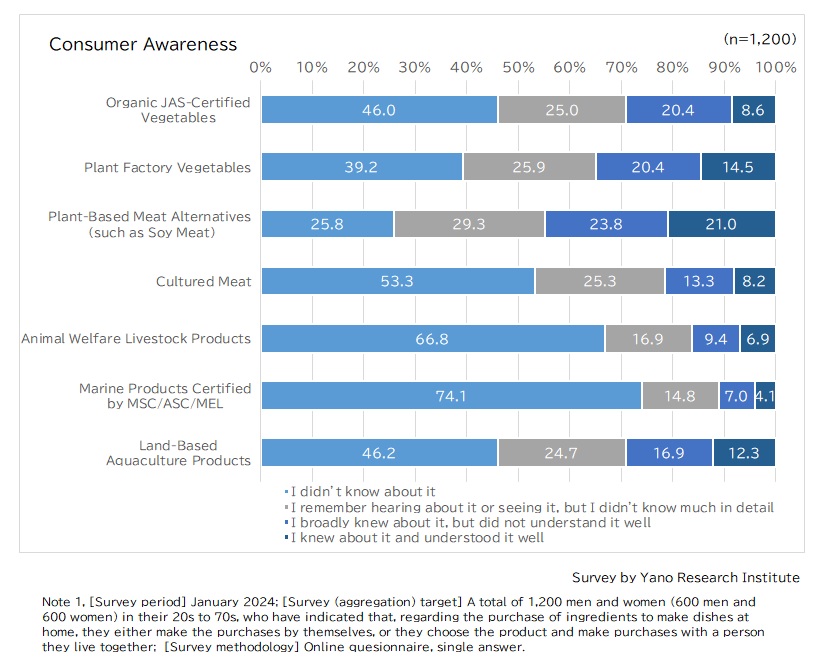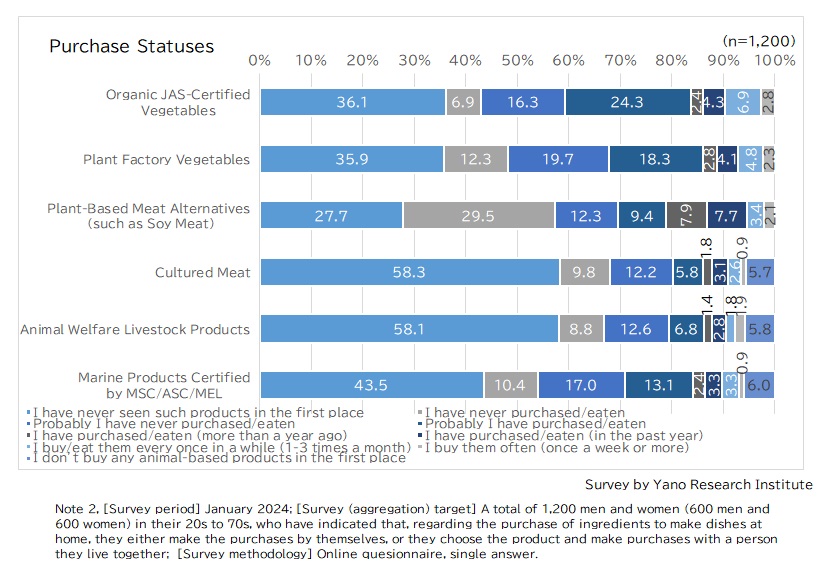No.3524
Consumer Survey on Sustainable Food in Japan: Key Research Findings 2024
Consumer Survey Revealed Plant-based Meat Alternatives as A Most Recognized Category of Sustainable Food - 74.1% Recognizes
Yano Research Institute (the President, Takashi Mizukoshi) has carried out a consumer survey on sustainable food in Japan, regarding consumer awareness, purchase statuses, and conditions for purchase. Potential consumer demand for sustainable food is observed using machine learning software (AI software for data analytics) and statistical analysis method. This press release denotes part of the analytical finding.


Summary of Research Findings
This consumer survey was carried out in January 2024 to a total of 1,200 men and women in their 20s to 70s, who indicated that they purchase ingredients to make dishes at home, or they choose and make purchase of ingredients with a person they live together, to find out the consumer awareness, purchase statuses, and conditions for purchases regarding seven categories of sustainable foods (1. organic JAS-certified vegetables, 2. plant factory vegetables, 3. plant-based meat alternatives, 4. cultured meat, 5. animal welfare livestock products, 6. MSC/ASC/MEL-certified marine products, and 7. land-based aquaculture products). Potential consumer demand for sustainable food was considered using machine learning software (AI software) and statistical analysis method. This press release denotes part of our analytical finding. Please note that respondents were given a brief explanation to each of the seven categories prior to the survey.
Regarding the question asking about the awareness of sustainable food, we have collectively named the respondents that chose options other than “I didn’t know about it” collectively as “recognizers”. In other words, they are the ones that have selected response options of “I remember hearing about it or seeing it, but I didn't know much in detail”, “I broadly knew about it, but did not understand it well”, or “I knew about it and understood it well”. The ratio of the “recognizer” was highest for plant-based meat alternatives (such as soy meat) at 74.1%, followed by 60.8% for plant factory vegetables, 54.0% for organic JAS-certified vegetables, 53.9% for land-based aquaculture products, 46.8% for cultured meat, 33.2% for animal welfare livestock products, and 25.9% for MSC/ASC/MEL-certified marine products.
It is speculated that the plant-based meat alternatives (such as soy meat) have become relatively well recognized by consumers in recent years due to increased opportunities to be seen by general public, as restaurant chains developed food menus using soy meat and supermarkets shelve them as merchandise.
Noteworthy Topics
With regard to the questions asking about purchase statuses of sustainable food (single answer), we have named the respondents that selected “I have bought it or eaten it (more than a year ago)”, “I have bought it or eaten it (in the past year)”, “I buy it or eat it sometimes (once to three times a month)”, and “I buy it often (once a week or more)” collectively as “Purchasers”. The ratio of “purchasers” was 21.1% for plant-based meat alternatives (soy meat), 16.4% for organic JAS-certified vegetables, 14.0% for plant-factory vegetables, 9.9% for land-based aquaculture products, 8.4% for animal welfare livestock products, and 7.9% for MSC/ASC/MEL-certified marine products.
The results of this survey indicate that there are reasonable differences among the seven sustainable food categories surveyed in terms of recognition and purchase frequency. We believe that this is due to the presence or absence of benefits that consumers can feel from that particular type of food, such as in price, taste, and safety. Promoting sustainable food is an approach that fosters environmentally and socially conscious production and consumption, which eventually brings advantage to consumers. However, it will take more time for people to get accustomed to taking this type of food as their daily meal. In order to convince consumers that sustainable food is a good option for their daily diet, consumer awareness needs to be increased by means of the dissemination of various information.
* For the questions regarding the purchase of sustainable food, respondents were asked to choose from the following options: “I have never seen such products in the first place”, “I have never purchased/eaten”, “Probably I have never purchased/eaten”, “Probably I have purchased/eaten”, “I have purchased/eaten (more than a year ago)”, “I have purchased/eaten (in the past year)”, “I buy/eat them every once in a while (once to three times a month)”, “I buy them often (once a week or more). Note that respondents could also choose “I don’t buy any animal-based products in the first place” for the purchase of animal welfare livestock products, MSC/ASC/MEL-certified marine products, and land-based aquaculture products.
Research Outline
2.Research Object: A total of 1,200 men and women (600 men and 600 women) in their 20s to 70s, who have indicated that, regarding the purchase of ingredients to make dishes at home, they either make the purchases by themselves, or they choose the product and make purchases with a person they live together. *Translator’s note: For the reason of “a person they live together” not specifically defined in the original press release, terms like “cohabitant” and “roommate” are deliberately avoided in this translated version.
3.Research Methogology: Online survey
Consumer Survey on Sustainable Food
Consumer survey was conducted in January 2024 to a total of 1,200 men and women (600 men and 600 women) in their 20s to 70s, who indicated that they purchase ingredients to make dishes at home, or they choose and make purchase of ingredients with a person they live together, to find out the consumer awareness, purchase statuses, and purchasing conditions. Potential consumer demand for sustainable food was observed using machine learning software (AI software) and statistical analysis method. This press release denotes part of our analytical findings.
Please note that sustainable food in this research refers to farm produce, livestock products, and marine products that are produced and/or processed in sustainable methods, including the methods that take consideration of environment.
This consumer survey targets to the following seven categories of sustainable food:
1) “Organic JAS-Certified” Vegetables: Vegetables shipped by business entities that have been accredited as “Organic JAS-Certified entity” by MAFF. They are vegetables that are grown without the use of agrochemicals to avoid impacting species and natural environment.
2) Plant Factory Vegetables: Vegetables grown in closed plant factories without using soil, where the light, temperature, and humidity are controlled by means of human intervention. As they are grown indoors, these vegetables are not affected by climate changes, and can be nurtured with small amount of water. For these reasons, they can be supplied stably.
3) Plant-Based Meat Alternatives (such as Soy Meat): Processed food with a meat-like food texture that are made from legumes like soybeans or vegetables as ingredients. They are sold as products at retailers such as supermarkets and served as menus at restaurants.
4) Cultured Meat: Animal meat (beef, pork, chicken, etc.) that are produced by cultivating animal cells in a lab. At present, cultured meat is still in development phase in Japan, yet to be released in the market.
5) Animal Welfare Livestock Products: Products made from animals raised in methods in respect of their well-being (freedom to move around, etc.,) which stands on a belief that they should live healthily and comfortably. High animal welfare is believed to reduce stress and prevent diseases of farmed animals.
6) Marine Products Certified by MSC/ASC/MEL: The MSC label is applied to wild fish and seafood from fisheries that have been accredited as performing sustainable fishing defined by Marine Stewardship Council (MSC). The ASC label identifies farm-grown seafood that are produced by processes that adhere to sustainable processes. The MEL label is a certified by the Marine Eco-Label Japan Council (MEL) to fishery businesses (producers, processors, and distributors) who proactively engage in sustainable use of marine resources and take initiatives in activities to protect marine ecosystem. MSC, ASC, and MEL labels are issued separately by each certifying body.
7) Land-Based Aquaculture Products: The cultivation of fish and other marine products in an artificial environment, such as a tank or facility on land.
<Products and Services in the Market>
Farm produced crops (“organic JAS-Certified vegetables”, plant factory vegetables), meat alternatives (plant-based meat, cultured meat), livestock products (animal welfare livestock products), marine products (MSC-/ ASC-/ MEL-certified seafood, land-based aquaculture, seafood)
Published Report
Contact Us
The copyright and all other rights pertaining to this report belong to Yano Research Institute.
Please contact our PR team when quoting the report contents for the purpose other than media coverage.
Depending on the purpose of using our report, we may ask you to present your sentences for confirmation beforehand.